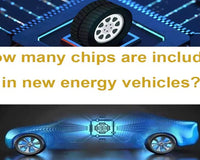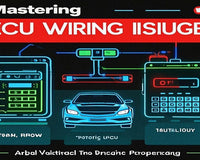In the past, car chip tuning was mostly about getting more speed or better acceleration, with no concern for how much fuel the car was burning or the amount of pollution it was putting out. But now, there’s a big focus on balancing performance with being environmentally responsible. Enter eco-friendly chip tuning, it will as a sustainable alternative to traditional vehicle upgrades. Unlike conventional chiptuning, which often focuses solely on boosting horsepower, eco-focused tuning is engineered to optimize your engine’s efficiency, slashing fuel use while reducing your carbon footprint.
ECU is a “brain” that regulates key functions like fuel injection, ignition timing, and airflow. Chip tuning involves modifying the software that controls your vehicle’s engine control unit (ECU), this precise modification relies on professional tools like the Wellon VP898 Programmer, which enable technicians to safely access and recalibrate ECU data. Traditional tuning might tweak these settings to maximize speed or acceleration, but eco-friendly chiptuning takes the opposite approach: it recalibrates the ECU to prioritize efficiency without compromising basic performance.
Modern engines, the factory are often designed with a safety margin, which a buffer to account for varying fuel qualities, driving conditions, and global emissions standards. This margin means your engine is rarely operating at its most efficient. Eco-chiptuning narrows that gap by adjusting parameters like:
Fuel injection timing: Ensuring fuel is delivered in precise amounts, at the optimal moment, to avoid wasteful over-fueling.
Air-fuel ratio: Balancing the mix of air and fuel for complete combustion.
Ignition timing: Fine-tuning when the spark plug fires to maximize energy from each fuel droplet.
Turbocharger boost pressure: Reducing unnecessary boost during low-load driving to cut fuel use.
These parameter adjustments are made possible by advanced programmers such as the Orange 5 Programmer, which ensure technicians can make accurate, non-damaging tweaks to the ECU.
How eco-friendly chiptuning to Boosts Fuel Efficiency?
1. Eliminating Factory Sluggishness
Many vehicles leave the factory with conservative ECU settings to accommodate diverse driving styles and low-quality fuel. This can lead to sluggish acceleration, where the engine burns extra fuel to compensate for delayed power delivery. Eco-chiptuning smooths out this response, using tools like the KT200II ECU Programmer to access the ECU’s core data, technicians optimize fuel injection and ignition timing to deliver power more efficiently, so you don’t have to press the gas pedal as hard to reach your desired speed.
2. Optimizing for Real-World Driving
Factory ECU maps are designed for average conditions—not your specific commute. Eco-chiptuning can be tailored to your typical driving habits.
Is Eco-Friendly Chiptuning Right for You?
Eco-chiptuning works best on modern, fuel-injected vehicles. Older carbureted engines or hybrid/electric vehicles may not see the same benefits. Consult with a professional to confirm your car is a good candidate, poorly executed tuning can damage your engine or void your warranty.
More drivers are turning to eco-chiptuning as a cost-effective, low-effort way to reduce their environmental impact. However, chip tuning is a tool—not a fix-all. To maximize savings, please avoid rapid acceleration or hard braking, and keep your tires properly inflated and your engine well-maintained.
Eco-friendly chiptuning proves that you don’t have to choose between performance, savings, and sustainability. By optimizing your engine’s ECU to run more efficiently, it cuts fuel costs, reduces emissions, and keeps your vehicle running smoothly, all without the need for expensive hardware upgrades.
How Eco-Friendly Chiptuning Improves Fuel Efficiency










